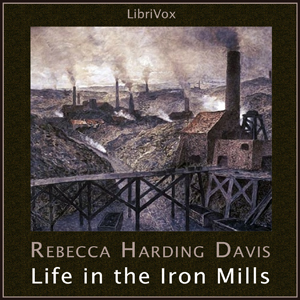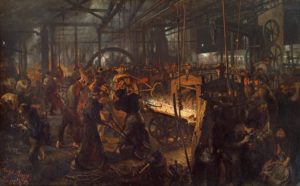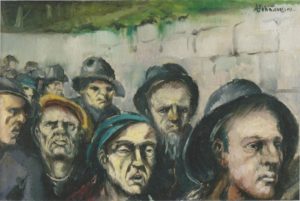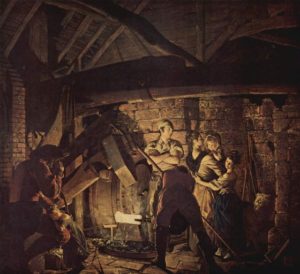INJUSTICE should produce two questions:
(1) Could you live with it?
(2) Now what will you do?
 “Civil War Literature and Culture” is an IUPUI class I have been privileged to take this semester with the brilliant professor, Jane Schultz. One of our earliest readings was from Rebecca Harding Davis’s “Life in the Iron-Mills.” [Listen to “Iron-Mills” read aloud here.] To say that I was shocked at what I read would be an understatement. Deprivation, darkness, and despair is pervasive in the awful conditions in which 19th century American workers suffered.
“Civil War Literature and Culture” is an IUPUI class I have been privileged to take this semester with the brilliant professor, Jane Schultz. One of our earliest readings was from Rebecca Harding Davis’s “Life in the Iron-Mills.” [Listen to “Iron-Mills” read aloud here.] To say that I was shocked at what I read would be an understatement. Deprivation, darkness, and despair is pervasive in the awful conditions in which 19th century American workers suffered.
Injustice bleeds through “Iron-Mills” so Davis’s readers can share the reformer’s outrage. Great speeches move crowds to tears and cheers. Great literature changes internal barometers. Great histories convince the present that past work is unfinished. Great ethnographic narratives hold a mirror to our humanness asking, “Would you like to live like this?”
 We investigate historic persons – Rebecca Harding Davis –who speak to us from the jury box. Their words compel us to hear their verdict. We are awakened to and warned of working conditions no matter time, place, people, or culture. The gavel of justice needs to fall on our collective human condition. If we care to listen, we take notice, we urge others to hear, to read what we have read.
We investigate historic persons – Rebecca Harding Davis –who speak to us from the jury box. Their words compel us to hear their verdict. We are awakened to and warned of working conditions no matter time, place, people, or culture. The gavel of justice needs to fall on our collective human condition. If we care to listen, we take notice, we urge others to hear, to read what we have read.
Davis’ words below could be multiplied a dozen times over in “Iron-Mills,” each ringing bells of injustice:
12-14 hour work days reduce a millworker’s mind to“dullness, stupidity”
Workers are said to be deformed “almost a hunchback”
A worker’s “waking stupor [is] smothered pain and hunger”
Men are likened to animals, “in dens of drunkenness”
People are described as “beaten hounds”
Factory workers have become “machines”
Life is “pregnant with death”
Machines “groan, shriek, sob like gods in pain”
The factory is described as the “Devil’s place”
 On the contrary, Davis says, those who pursue only “net profits” care only for their own “money and glory.” Some business leaders are willing to “wash [their] hands of all social problems” concluding “I am not responsible.”
On the contrary, Davis says, those who pursue only “net profits” care only for their own “money and glory.” Some business leaders are willing to “wash [their] hands of all social problems” concluding “I am not responsible.”
If we are left unmoved by reading, I fear business will perpetuate the corrupt human model of carelessness for “these people,” its workers. Scrooge-like response toward workers ends in empty pockets and empty lives.
We hear the refrains again and again in Charles Dickens’ social criticism from Oliver Twist, Charlie Chaplin’s unspoken lament in Modern Times, Studs Terkel’s ethnography Working, Dr. Seuss’sskewering of position in Yertle the Turtle, J. D. Vance’s realism in Hillbilly Elegy, or Steven Frears’ film Dirty Pretty Things visually exposing the underbelly of privileged society. The “hope” Davis calls for again and again – “glimpse of another world than this” – is perhaps best displayed in what could be termed the anecdote for the disease of uncaring response to worker treatment, Stephen Mansfield’s The Search for God and Guinness.  [See my review here.]
[See my review here.]
So how will you answer my two questions that started this brief essay? Get all the facts, hear all sides, read, research, study, reflect, and communicate. If you want justice for yourself how will you give it to others?
If you are interested in my 1500 word essay on “Life in the Iron-Mills” I will be happy to send you a pdf copy. Email me your request: eckel1957@gmail.com The full title of the position paper is, “Incarnational Hermeneutics at the Bar of Literary Justice: Analysis of Descriptive Selections from ‘Life in the Iron-Mills’”
 Mark is President of The Comenius Institute (website), spends time with Christian young people in public university (1 minute video), hosts a weekly radio program with diverse groups of guests (1 minute video), interprets culture from a Christian vantage point (1 minute video)
Mark is President of The Comenius Institute (website), spends time with Christian young people in public university (1 minute video), hosts a weekly radio program with diverse groups of guests (1 minute video), interprets culture from a Christian vantage point (1 minute video)
Picture credit: snappygoat.com, wikipedia.com, librivox.org




